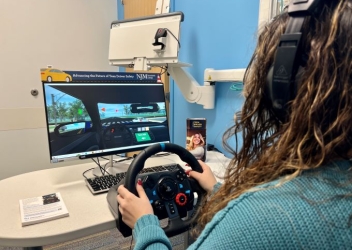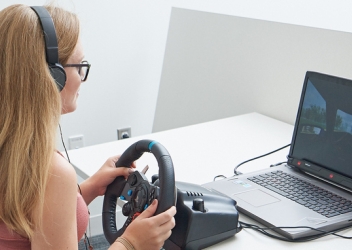Research Tools and Data Resources
The Center for Injury Research and Prevention has a variety of research tools and data resources that have been developed utilizing our interdisciplinary approach to child injury prevention science. The following technologies and datasets have been used in CIRP studies described in published scientific articles. For more information on these research tools and data resources for researchers or to request a specific measure, please contact us.
- CIRP Driving Simulators More
-
Our researchers are dedicated to understanding driving behaviors and performance to help improve the safety and health of children, adolescents, and young adults through qualitative and quantitative research conducted with our state-of-the art driving simulators. We also provide the technical and administrative support for other researchers to conduct simulator-based observational studies.
- Magnetoencephalography (MEG) ImagingMore

Magnetoencephalography, or MEG, is a non-invasive, safe, and precise imaging technique that allows researchers to learn more about the magnetic fields produced by electrical activity in the brain. CIRP researchers specifically use this technology to capture the brain’s ability to input and react to real-world driving situations. This research aims to better understand ongoing development of the brain and cognitive function during adolescence and the impact of that development on the safety of young drivers.
- Normative Dataset of Novice DriversMore
-
Researchers from the Center for Injury Research and Prevention at Children's Hospital of Philadelphia have leveraged their exclusive access to an innovative data source to investigate safety-critical driving skill deficits in novice drivers at the time of licensure. Led by Elizabeth Walshe, PhD and Flaura Winston, MD, PhD, they developed a normative dataset of novice drivers linking Ohio licensing and police-reported crash data to driver performance data on a new virtual driving assessment adopted by the state and delivered immediately before the on-road licensing examination.
- Sled Laboratory for Automotive Safety and Rehabilitation Biomechanics More

The Center for Injury Research and Prevention is in a unique position to study automotive safety biomechanics in order to keep human occupants safe in vehicles through research at the one-of-a-kind CHOP Sled Lab located on Drexel University's campus. With the rise of advanced vehicle technologies such as Automatic Emergency Breaking (AEB) comes an increased risk for injury of passengers and the need to study ways to keep those passengers safe. At the Sled Lab, Dr. Valentina Graci studies the effect of advanced and emerging vehicle technology on human physiology and kinematics, with a particular focus on age-and sex-based differences.
- Completed - New Jersey Safety and Health Outcomes (NJ-SHO) Data WarehouseMore

This comprehensive data warehouse has longitudinal information on 24 million individuals of all ages spanning almost 20 years. Data sources include six statewide administrative databases and individual- and community-level equity indictors, enabling rigorous investigation of injury and non-injury outcomes. It is the backbone of the new NJ-SHO Center for Integrated Data, funded by the New Jersey Division of Highway Traffic Safety (HTS), with a guiding vision to reimagine how safety and health data are collected, integrated, analyzed, and shared to support safe transport in NJ. Dozens of peer-reviewed papers have been published using the data warehouse, and numerous studies are underway.
Watch a video about how CIRP researchers are using various tools and data resources in their work.








